Posts published in 2017
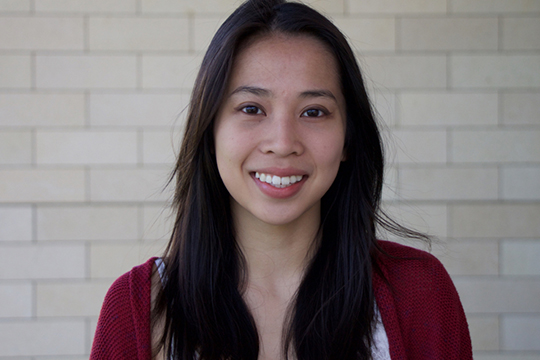
Living sustainably
By Thazin, ’15 (Electrical Engineering), MS ’16 (Sustainable Design and Construction)
Starting the day off with a nice morning jog, I arrive early at the Union of Concerned Scientists’ (UCS) headquarters in Cambridge, Massachusetts. After I’m done with a quick shower, more UCSers trickle in, many of whom took the subway or bus or biked over from various parts of the Greater Boston Area. For these clean energy warriors, the commitment to a sustainable planet starts even before the official work day begins.
As a Schneider Fellow, I had my own humble part to play at UCS. With the Climate and Energy team, I wrote reports on how community solar works and how the business models for electric utilities are evolving. While these topics may seem unrelated, they are both important pieces for enabling greater penetration of renewable energy from the different sides of the electricity meter.
The crucial lesson I learned that summer, however, was how those at UCS modeled hard work and integrity.
From informing the public with editorials to advocating for policy changes based on facts and rigorous analyses, every member of UCS worked relentlessly to fight for a healthier, safer world. As I enter the solar industry post-graduation, I will continue to do the same!
Schneider Fellows work at leading U.S. nongovernmental organizations (NGOs) to tackle today’s sustainable energy challenges.
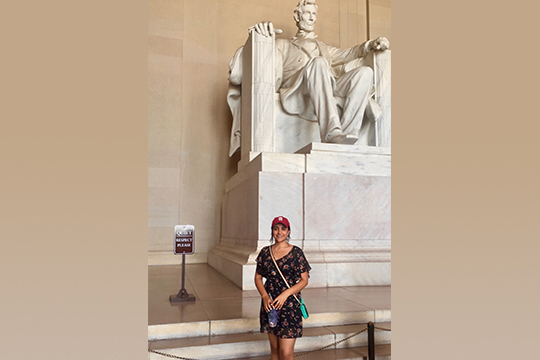
Advocating for responsible energy use
By Sadaf Sobhani, B.S./M.S. ’15; PhD Candidate
I spent last summer in Washington, DC working as an intern at the Energy Future Coalition, an initiative of the United Nations Foundation (UNF). As a PhD student in Mechanical Engineering, I work on developing computational tools to investigate alternative combustion systems. I spend most days writing code or discussing the technical details of my research. So the transition to Pennsylvania Ave was dramatic. Just the walk from the Farragut North station to my UNF office, located between the White House and the World Bank, was enough to remind me of the incredible opportunity I was given to work in the nation’s capital.
During the summer, I was involved with the Clean Fuels campaign, which calls attention to the epidemiological and environmental risks associated with the combustion of aromatic compounds in fuels. With my background in combustion science and engineering, I was able to contribute to the team’s efforts by translating the current scientific research into a comprehensive white page on the sources and potential impacts of emissions from automobiles, focusing on the influences of specific gasoline components and ethanol-gasoline blending. My work aimed to give insight into potential technical and policy responses to this issue. Through this experience, I gained a deeper appreciation for the complex processes involved in developing and implementing policies that advance us towards a more sustainable and cleaner energy future, a journey that I want to be actively involved in – both as a scientist and an advocate.
Schneider Fellows work at leading U.S. nongovernmental organizations (NGOs) to tackle today’s sustainable energy challenges.
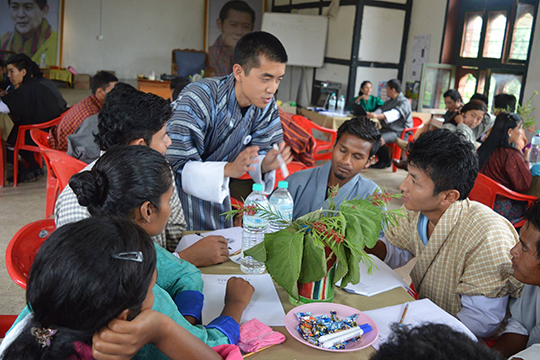
Investing in Bhutan’s youth
By Tim Huang, ’14 (B.A. Human Biology; M.A. Education)
I was drawn to the Himalayan Kingdom of Bhutan because of my interest in how the young democracy in transition was thinking differently about sustainable development and the well-being of its people. Thanks to a Haas summer fellowship, I spent two consecutive summers in college implementing a youth employment project with a local nonprofit, the Bhutan Youth Development Fund. After graduating from Stanford, I returned to Bhutan through the Omidyar Network International Public Service Fellowship, one of the Haas Center’s postgraduate fellowships. During my fellowship year, I worked to strengthen educational equity as a researcher for the Royal Academy, His Majesty the King’s Secretariat. I have since served as a Program Officer at the Bhutan Youth Development Fund, organizing child protection and youth empowerment programs with partners like UNICEF. Over the last 3 years, working in Bhutan has reinforced my belief that investing in the promise of our children and youth creates a more just and sustainable world.
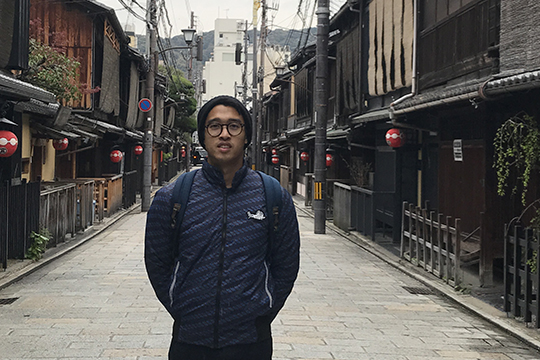
Complex, messy – and rewarding
 By Paricha Duangtaweesub, MS ’15 (Chemical Engineering)
By Paricha Duangtaweesub, MS ’15 (Chemical Engineering)
“What do you want to do after school?”
I rapidly became familiar with this question during my graduate studies, and soon I found myself responding with one version or another of the same response: “I want to apply what I learned to make an impact in renewable energy.”
I was a naïve student of chemical engineering then, cherry-picking engineering classes in renewable energy, crossing over to the GSB and d.school to round out my education. I thought social impact work would be straightforward and well defined, with the benefits as measurable as my grades or the applause after presentations. Did I mention I was naïve?
With much excitement, I accepted a summer Schneider Fellowship at the Natural Resources Defense Council in San Francisco right after graduation where I contributed to advocacy work in energy efficiency policy in California and India. Between studying technical potential of bio gas, writing comments to an ordinance proposed by the City of Palo Alto, and preparing a case study of building codes for Hyderabad, the learning experience was both challenging and rewarding.
I found that systems of people can be far more complex than any mathematical models taught in class. It is imperative that we understand the different needs of the stakeholders within the system that we promised to help – city residents, politicians, business owners, and government agencies – as well as the environment. As an engineer, I learned an important lesson: that technical knowledge is only part of the answer.
Schneider Fellows work at leading U.S. nongovernmental organizations (NGOs) to tackle today’s sustainable energy challenges.
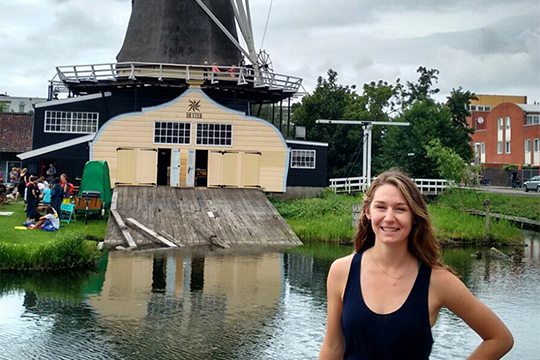
Greening cities
By Amy King, ’16 (Earth Systems); MS ’17 (Civil & Environmental Engineering: Atmosphere & Energy)
I make a quick stop at a café in Vondelpark before continuing my bike commute through Amsterdam en route to the office on the canal. Bike friendly and full of open spaces, Amsterdam is a model city for sustainability, and I contemplate its merits as I bike along the ancient streets.
Through a Schneider Fellowship, I worked six weeks in Washington, DC and six weeks in Amsterdam for the U.S. Green Building Council, producing the Global Real Estate Sustainability Benchmark Report, an annual account of how hundreds of international properties are striving for sustainable practices in their built environment.
Working with a multicultural team dedicated to urban sustainability, I edited and published the Innovative Case Studies section of the report, discovering along the way the wild ways companies are cultivating green practices in their business and buildings. One company had started a beekeeping program on their green roof, encouraging community and a buzzing bee population. Sharing these creative case studies showed me the green goals of big business, and gave me great hope! Discovering the impact possible in creating a greener built environment shifted my career trajectory from conservation to sustainable design, knowing I can best serve the natural environment by shaping the built one.
Schneider Fellows work at leading U.S. nongovernmental organizations (NGOs) to tackle today’s sustainable energy challenges.
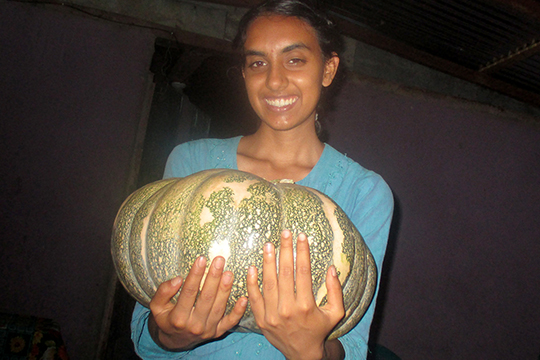
Caring for what we have
By Sneha Ayyagari, ’17 (Environmental Systems Engineering); MS ’19 (Civil and Environmental Engineering: Sustainable Design and Construction)
“Development is when people grow their conscience.” That is how a war veteran, skilled farmer, and environmental educator described to me what it means to create sustainable development. He explained that it doesn’t matter how much people do or don’t have; what matters is that they care for and care about what they have.
As a Schneider Sustainable Energy fellow in 2015, I worked with Asofenix, a grassroots organization that works to develop and improve the lives of rural Nicaraguans in the villages in the hilly state of Boaco. Throughout my fellowship, I supported projects that improved quality of life such as installing renewable energy, potable water infrastructure, irrigation systems, and clean cookstoves; creating an environmental education program; and supporting sustainable agriculture in the community where I worked and lived. I saw how the technical and educational parts of energy projects fit together into an integrated and transformational program. I was deeply moved by the opportunity to learn the stories of the resilient and loving people I worked with.
I also enjoyed learning the nuances of Nicaraguan culture, and the people I worked with became part of my family. I continue to call them every week. This fellowship reinforced my desire to couple my technical skills and interest in environmental engineering with my passion for teaching to create a more just and sustainable world.
Schneider Fellows work at leading U.S. nongovernmental organizations (NGOs) to tackle today’s sustainable energy challenges.
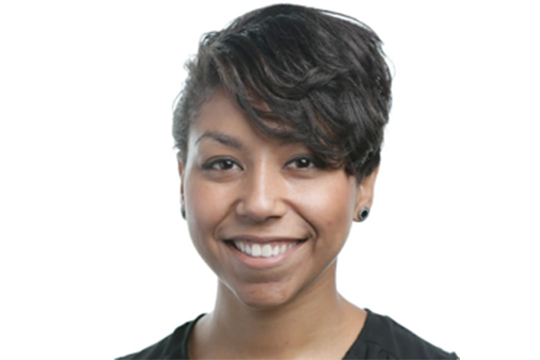
Returning to Guatemala
By Alicia Robinson, ’11 (International Relations)
I came to Stanford after spending most of my life living in Guatemala, where my mother worked for the United Nations. As an international relations major, my focus was on human rights and international law. As a sophomore, I obtained the Stanford Human Rights fellowship to work for UNICEF in Cairo. I was a member of the Stanford Rotaract Club, where I organized a service trip to Guatemala and also co-founded the Central American Students Association to raise awareness on campus about the socio-political realities of this region. I subsequently pursued my JD at Harvard Law School, where I continued to study human rights and post-conflict peace-building. I decided to return to Guatemala to contribute to efforts to curtail impunity, which has severely affected the country’s overall stability in recent years.
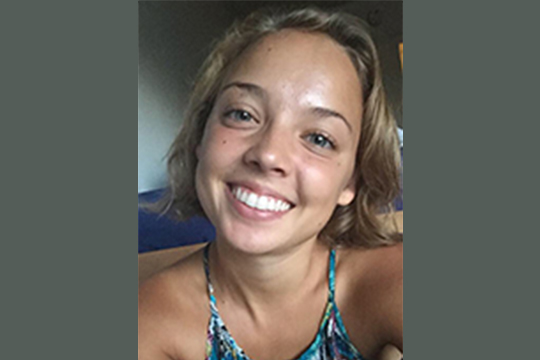
From Sequoia to Spain
By Celina Jackson, ’17 (Comparative Studies in Race and Ethnicity)
After fifth period comes to a close, I sit down with Mr. Rosario to debrief his English Support class — I volunteer there, at Sequoia High School, through the Haas Center’s High School Support Initiative. During the one hour and forty minute period I typically work with individual students, discussing their literary analyses of Richard Wright’s Black Boy and helping them pick apart the meanings of certain passages. I follow Mr. Rosario’s lead in encouraging students to find parallels between the life of the narrator – a black boy in the early 20th century south – and their own lives as mostly low-income Latinx students in the Bay Area in 2017. On the scenic drive back to Stanford along Alameda de las Pulgas, my carpool buddy and I chat about how difficult teaching is, our burning frustrations with the education system, and the inspiring moments when we connect with students or witness them realizing, “I get it.”
Over the past quarter, Mr. Rosario and his ninth graders have made my Tuesday afternoons joyful, challenging, and always energizing. The experience has been deeply rewarding for me on both a personal and a career level – I will be joining the teaching field next year on a Fulbright grant in Spain! – and I am extremely grateful for the opportunity to participate.
Celina is a student leader for the Haas Center’s High School Support Initiative, a program that allows students to work with underserved youth at local high schools.
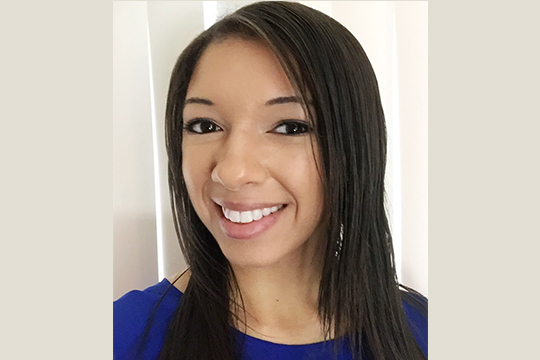
Finding the “why”
By Charlene Chambliss, ’17 (Psychology)
As soon as I mentioned that I was a Psychology major, Maria began excitedly peppering me with questions about the cultural psychology of South Korea, a culture she had come to be fascinated with through her love of K-pop and other Korean music. Time flew as I explained what I knew about how cultural norms develop differently in different societies, and I enthusiastically introduced her to many of my favorite methods for exploring a new subject online and by getting cheap used books through Amazon. When time came for me to go back to campus, I didn’t want to leave—helping empower Maria to feed her curiosity had easily been the most fulfilling thing I’d done all week.
I noticed that many of the students I worked with at Sequoia High School seemed to be “going through the motions” of their classes, following the path that they’ve been put on without a strong sense of purpose. At their age, I had often felt the same way—I had been taught to do well because it would pay off later. These students do want help with their homework, but what they really want is a reason to get excited about learning, a reason beyond “college and a good job” that speaks to their hopes and dreams for the future, and what kind of person they want to become. These youth are impressive—independent, resourceful, and willing to work hard. They’ve got a handle on the “how.” Now, all they need is their “why.”
Charlene is a student leader for the Haas Center’s High School Support Initiative, a program that allows students to work with underserved youth at local high schools.
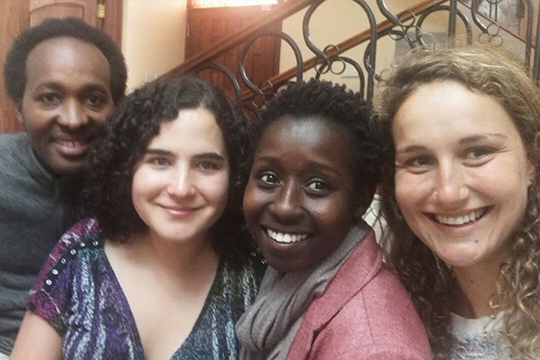
Research rooted in public service
by Ashley Jowell, ’17 (Human Biology) and Sharon Wulfovich, ’17 (Human Biology)
The sun was setting upon Arusha, Tanzania, as we joined together for an evening discussion. We, along with our translator, Jenipher, and project manager, Sianga, enjoyed our home cooked meal in celebration of completing our 16th interview. Our faces were glowing as we sipped our tea, finished our last bites of mchicha, and discussed the data we collected as well as its potential impact. The stories Maasai women shared had been informative, alarming, and inspiring as they described the impact that moving to Arusha from their village had on their lives. How, we discussed, might we use this research to benefit the women facing such hardships upon migrating? This was a conversation we would continue to grapple with throughout our entire project and on-campus conversations.
Our research, designed in collaboration with The Future Warriors Project, a Maasai-run NGO created by Sianga, involved interviewing female Maasai migrants who had moved to Arusha. While both researchers were looking at the impact of this journey on their health, Sharon’s project focused on health decision making behavior and Ashley’s focused on resilience and identity. As the four of us bounced ideas, we felt honored to conduct research that strove to benefit the community we were so privileged to serve.
Ashley is a member of the Public Service Scholars Program at the Haas Center, where she has continued engaging in discussions on scholarship & ethical service.
